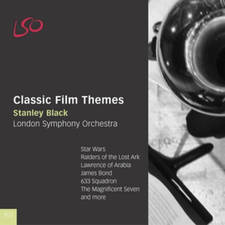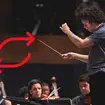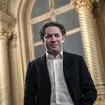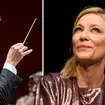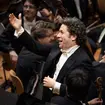Superstar conductor Gustavo Dudamel calls for change in education: ‘The first thing that’s cut is the arts’
11 September 2023, 17:40 | Updated: 13 September 2023, 06:44

Conductor Gustavo Dudamel on music education and the magic of Latin American music
The Venezuelan maestro spoke exclusively to Classic FM about how classical music can inspire and transform the lives of young people – and why governments should harness that power.
Listen to this article
Last month, one of Latin America’s greatest orchestras and its inspirational conductor were in the Scottish capital as part of the Edinburgh International Festival.
42-year-old Venezuelan conductor Gustavo Dudamel has directed the Simón Bolívar Symphony Orchestra since 1999. Over the last 20 years, he has become a household name, directing the LA Philharmonic since 2009, and soon to take on top role at the New York Philharmonic.
The Simón Bolívar Symphony Orchestra of Venezuela is comprised of over 200 young musicians between the ages of 18 and 28, many from disadvantaged backgrounds.
And it was with young people and the importance of music education, that Dudamel cut his teeth.
“I am a very optimistic person,” the conductor told Classic FM. “I think this is crucial in believing and working in what we do.”
But he was quick to highlight a change in mindset that he thinks is needed within society and leadership, at a time when budgets for the creative arts are scrutinised and squeezed.
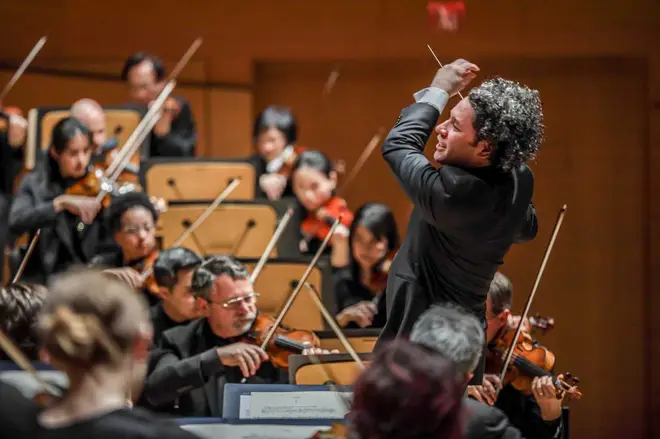
“In these moments, culture is seen as the entertainment element, and only [being] part of entertainment,” he said, adding, but, “culture is identity”.
“Culture is a spiritual connection,” he said. “It offers transformation through beauty, so it goes beyond something technical or necessary to entertain – it goes down to the soul of our young people.”
The conductor said that in a fast-paced world, where the focus is often immediate productivity, music has an important role in slowing things down and bringing people together.
“[It’s a] real chance of contemplation in a group, as an individual, but also as a group creating harmony for others... beauty is about interaction to create harmony together,” Dudamel remarked.
Music is “a language – a universal language”, the conductor added. “Music has many elements that are important for the evolution of humanity. Music is important because it fulfills our spirit, our souls and it connects us without saying [words] to each other.”
Read more: When Gustavo Dudamel played violin and Itzhak Perlman conducted in a reverse duet for the ages
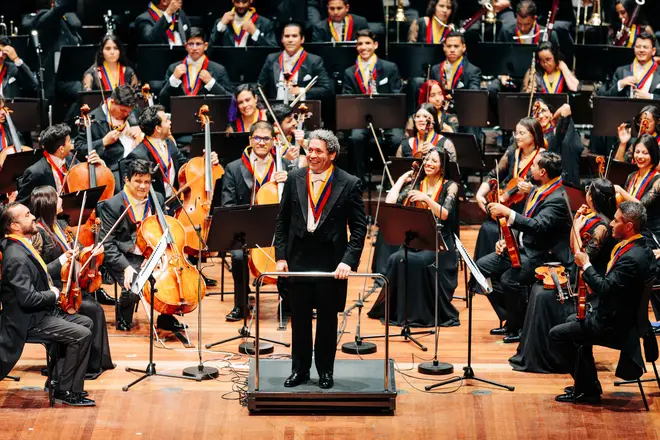
‘We need to change the education mentality’
The conductor remains the poster boy of the music education initiative El Sistema, originating in Venezuela but inspiring similar programs in more than 60 other countries, including Scotland. Its aim is to use classical music and access to free instruments to promote opportunity and social change for young people in disadvantaged communities.
Dudamel was quick to highlight how music can act as a vehicle for social transformation for people of all backgrounds.
Access to music, he said, has been reduced to the “elite”. But people in poverty need to feel a sense of identity and purpose – and that’s what music can offer.
“You don’t have an identity – so you bring the young people to have an instrument,” the conductor said. “This not only the physical instrument, but a gift of spiritually to that child, you know, to fulfil [their] soul. That is about music.”
The maestro called on governments and leadership not to strip away music from schools and communities, as so often happens during periods of stretched budgets and austerity.
In times of financial crisis, he said: “The first thing that gets cut is art and culture. We have to change that mentality. It is not for a reduced group in society, it’s needed for the dedication [and] the spirit of the new generations.”
“Because if not... I don’t know where we are going as a world.”

Gustavo Dudamel conducts the L.A. Philharmonic in Tchaikovsky's 'Hamlet'
‘We build bridges between music genres’
Last week, Dudamel announced his latest album with the Los Angeles Philharmonic, Fandango. The album features music from some of the biggest 20th-century Latin American composers, including Alberto Ginastera’s Estancia and the world premiere recording of Arturo Márquez’s Fandango, performed by star violinist Anne Akiko Meyers.
“In Los Angeles, one of the most important things is at the same time that we are playing Beethoven and Brahms, we have the chance to play with Chris Martin, Coldplay or Ricky Martin. We do a Latin American repertoire and have chance to make bridges. I think in our world, we are in an intensity of creating borders, between each other.”
“When you build bridges, you see that the differences are not so much,” Dudamel told us.
For the conductor, the music of this album forms one of those bridges, between Western symphonic traditions, and the vibrancy and fire of Latin American music.
“The thing is to take that music that for people is exotic, and made that part of the regular repertoire,” he said.
“[We’re bringing] joy through the beautiful rhythms and harmonies of Latin American music – I'm very happy with this recording.”

Anne Akiko Meyers, Gustavo Dudamel, LA Phil ~ Fandango by Arturo Márquez on Platoon
‘Nicola Benedetti understands the artistic element of social change’
In 2023, star Scottish violinist Nicola Benedetti took up a new role as Festival Director for the Edinburgh International Festival.
Benedetti herself has been a longtime advocate for music education and change, and her Benedetti Foundation seeks to share the magic of string playing in both virtual and in-person workshops.
“Our wonderful violinist!” exclaimed the maestro. “She understands that dimension of music – that art and artistic element of social change.”
“This is something she understands very well,” Dudamel continued. “She’s been supporting all the young musician programmes and creating that community.”
“We are very honoured to have her as part of our family – and of that system and family of music education.”
“I’m a son of this wonderful family,” he said. “I didn’t learn about this in a book or [by] somebody telling me. I passed through all of this experience, of having music as a very important part of my life, and [having] created a life through music, with my friends and with my family.”
